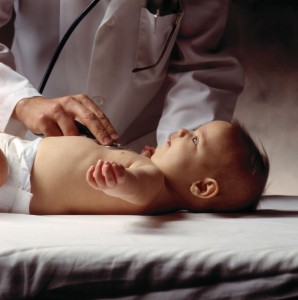Epilepsy & Cerebral Palsy Linked to Antibiotics During Pregnancy
 A UK study has found a small link between a certain class of antibiotics and a higher incidence of cerebral palsy and epilepsy. While the findings have led some scientists to caution against the use of certain antibiotics during pregnancy, leaving infections untreated continues to be considered a higher risk for unborn children. In addition, other causes of cerebral palsy may be a greater concern due to their higher incidence overall.
A UK study has found a small link between a certain class of antibiotics and a higher incidence of cerebral palsy and epilepsy. While the findings have led some scientists to caution against the use of certain antibiotics during pregnancy, leaving infections untreated continues to be considered a higher risk for unborn children. In addition, other causes of cerebral palsy may be a greater concern due to their higher incidence overall.
Researchers from University College London and the Farr Institute of Health Informatics Research, London, conducted a retrospective cohort study involving more than 195,000 patient records. More than 64,000 of those women had been prescribed antibiotics to treat various illnesses during their pregnancy. Researchers compared the women who had been prescribed penicillin versus women who were prescribed another category of antibiotics known as macrolides, which includes the common antibiotic erythromycin.
Certain antibiotics posed higher risk
In the women who were prescribed penicillin, which made up more than two-thirds of the patients in the study, researchers found no increase in the incidence of babies diagnosed with cerebral palsy or epilepsy. However, women who took macrolides during their pregnancy were more likely to have a baby with cerebral palsy or epilepsy. In the penicillin group, the incidence of these conditions was six in 1,000, while 10 in 1,000 women taking a macrolide had a child diagnosed with one or both of the conditions.
While the numbers were compelling, researchers cautioned that they did not prove a definitive cause and effect between taking antibiotics during pregnancy and developing epilepsy or cerebral palsy. The connection might actually be attributed to the type of infection the woman had or other factors unrelated to the antibiotic. Researchers also warned that leaving an infection untreated during pregnancy posed a much bigger risk to the unborn child than taking an antibiotic to treat the infection.
Possible causes of cerebral palsy
When a child is diagnosed with a debilitating condition like cerebral palsy, it is natural for parents to search for the root cause. In some cases, the condition may be directly attributed to a specific event, like birth complications that led to oxygen deprivation during labor and delivery. Other possible risk factors for cerebral palsy include infections during pregnancy.
Complications during labor and delivery must be handled appropriately to avoid injury to the unborn child. When errors occur in the delivery room, such as failing to detect warning signs of fetal distress or delaying birth of a child in distress, the results can be significant to both the child and the family. Birth injuries can lead to lifelong disabilities that can prohibit a child from every being able to live independently.
While it is important to understand risk factors that can occur during pregnancy, such as taking certain types of drugs or exposing the unborn child to other potential toxins, medical negligence can also play a role.
- The Guardian, Antibiotic Used in Pregnancy Linked to Epilepsy and Cerebral Palsy, http://www.theguardian.com/science/2015/mar/25/antibiotic-used-in-pregnancy-linked-to-risk-of-epilepsy-and-cerebral-palsy
- CerebralPalsy.org, Causes of Cerebral Palsy, http://cerebralpalsy.org/about-cerebral-palsy/cause/
- NHS, Do Antibiotics in Pregnancy Cause Cerebral Palsy and Epilepsy? http://www.nhs.uk/news/2015/03March/Pages/Do-antibiotics-in-pregnancy-cause-cerebral-palsy-and-epilepsy.aspx
- BootsWebMD, Cerebral Palsy Link to Antibiotics Disputed, http://www.webmd.boots.com/pregnancy/news/20150327/cerebral-palsy-link-to-antibiotics-disputed


 Resources
Resources
 Resources
Resources
